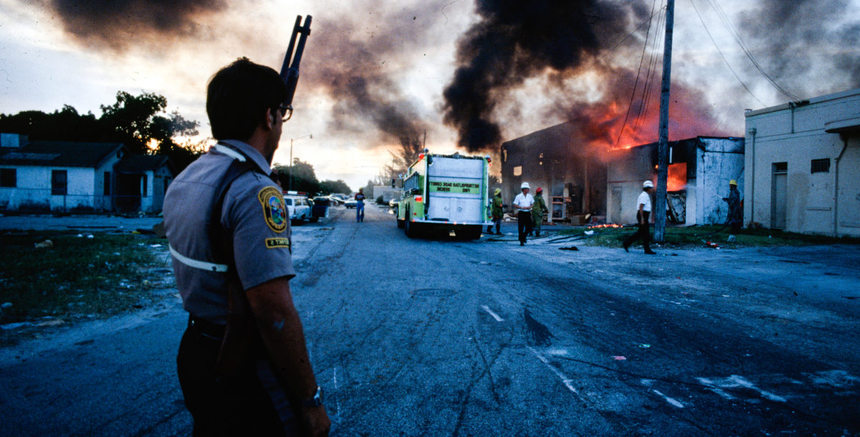Miami 2020 Review: WHEN LIBERTY BURNS, The Story of the Miami Riots

Like many non-Americans, growing up, my first introduction to police brutality against Black Americans was the Rodney King case of 1992. And like many Canadians, my knowledge of Florida extended to March breaks that I would spend with my grandparents in New Smyrna Beach (and Disneryworld). But of course this kind of police brutality had been going on for decades, and another 'incident' involving a Black man being attacked (in this case killed) by police, the police being acquitted, and this subsequentally causing a riot in their city, had happened before.
For his second feature documentary, Dudley Alexis addresses the far less famous, but equally important case of Arthur McDuffie and the Miami riots in When Liberty Burns. In 1979, McDuffie ran a red light; he was chased by police and so he stopped and surrendered. He was then brutally beaten to death, as the coroner made clear. But the police officers were found not guilty by an all-white jury, and almost immediately, the riots began. They would eventually cause millions of dollars in damage, the deaths of 18 people, and become a focal point of decades abborhant treatment of Black residents of Miami.
Like any good documentary telling a story that likely many people don't know (or don't know in detail), Alexis begins by giving a history of Black settlement and residence in Miami from post-civil war onwards. Many likely tend to forget that Florida was/is a southern state, and as such, Jim Crow laws and segregation were in full force in the state through much of the 20th century. Historians and local figures are interviewed, giving rich detail about the traditional Black neighbourhoods, how they both suffered and thrived, and how, of course, the city and country authorities tried to destroy them (for one, putting a major highway right through one predominantly Black neighbourhood when other routes were available).
The details of the case are upsetting, if not surprising, to listen to; again, Alexis and his team have edited the story together with interviews and footage in such a way that the factual details are given, but the emotional impact are not glossed over. Space is given to the interviewees - McDuffie's family, Black leaders, historians, police officers from the time, all give account to the events leading up the McDuffie's murder, the event itself, and the riots that followed. The editing weaves it all in so that separation of cold factual history from emotion is impossible, as it should be: these were people's lives that the authorities tore apart, without provacation.
That this story is not as well known as others might be due to the time at which it happened, or the lack of video proof (though there was proof enough of the murder). Placing Florida in the southern context (when it is often left out), and understanding the world in which Black people of Miami and the region, such as McDuffie, existed, and what they faced - and knowing how little has changed, at least in the United States, makes for sobering viewing.
When Liberty Burns not only tells a story forgotten by much of America, but puts it in its rightful context - while it is true that there can be no peace without justice, there can also be no understanding without context.







